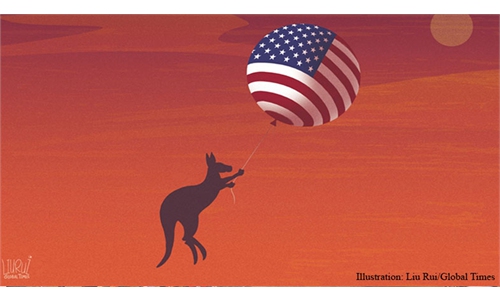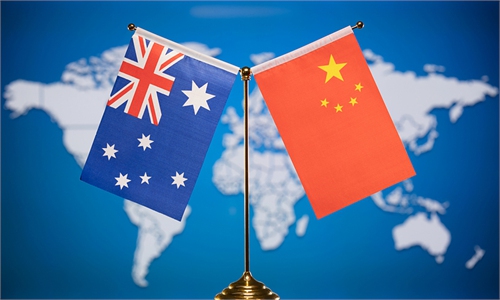
Illustration: Chen Xia/Global Times
Although Australia has not made a decision to ban WeChat, its fate is getting a great deal of public attention. At a time when China-Australia relations are at a critical juncture, Australia should not repeat the mistake it made in 2018 in banning Huawei from its 5G wireless network. Many see this decision as the spark that set off bilateral economic clashes.
A senate committee in Australia investigating how foreign powers use social media to interfere in the country has recommended a swathe of rules and restrictions for social media platforms, including potentially banning Chinese messaging service WeChat on government devices, Reuters reported on Tuesday.
Although the report's recommendations are not binding, it is concerned that such a move would, to some extent, affect the government's decision-making and deal a blow to Australia's business environment for Chinese enterprises.
Over the past year, the Anthony Albanese administration has shown a willingness after taking office to stabilize and improve relations with China, which has responded positively. There is a mutual recognition that the good momentum should not be interrupted by irrational anti-China views held by some politicians in Canberra. If bilateral economic cooperation encounters challenges and difficulties again, Australian companies will become victims of setbacks in bilateral ties. The facts of the past few years have fully proven this point.
Australia's ties with top trade partner China soured in 2018, when media reports said that the country became the first nation in the world to publicly ban China's Huawei from its 5G network, setting a bad precedent for other Western countries. Thus Australia is viewed by observers as an active player, or a daring vanguard in the US' anti-China strategy.
Some analysts said this was a dangerous signal, because it seemed that Australia was no longer satisfied with its role as a follower or an assistant of US strategy, and instead Australian politicians wanted to turn the country into a frontline soldier by actively expressing loyalty to the US.
Xiao Qian, China's ambassador to Australia, was quoted by the Associated Press as saying in 2022 that Australia had fired the "first shot" in its deteriorating relations with China in 2018, when the then-government of Morrison banned Huawei from rolling out the country's 5G network due to so-called security concerns.
We sincerely hope Australia won't make similar mistakes twice.
The Trump administration tried to ban WeChat from US app stores in 2020 on so-called national security concerns, but a US judge blocked the ban. As the US' ill-intentioned tech war against China escalates, media reports said in January that state workers in the US state of Ohio will be banned from using WeChat on state-issued devices, but there are still many opposing voices within the US.
At present, there are not many countries in the world supporting a ban on WeChat. If Australia allows itself to once again play a role as a vanguard to ban a well-known Chinese entity, it will send a wrong signal to the market, undermining market confidence in further improvement of bilateral economic and trade relations.
China and Australia enjoy strong complementarity in strengthening economic cooperation. Australia should avoid being kidnapped by US' anti-China strategy. It is in line with the essential interests of businesses from both sides if the two countries continue to push economic and trade cooperation.
The current improvement in bilateral economic ties is a hard-won outcome, which should be cherished and further promoted. It's a critical moment for pushing China-Australia economic and trade relations back on track.
Australia should avoid doing anything that would harm bilateral economic relations or market confidence. It is hoped that the Australian side can work with China to tap the potential of cooperation, cultivate and create new growth points, and continue to expand common interests.
The author is a reporter with the Global Times. bizopinion@globaltimes.com.cn



